
req_llm
Req plugin to query AI providers
Stars: 118
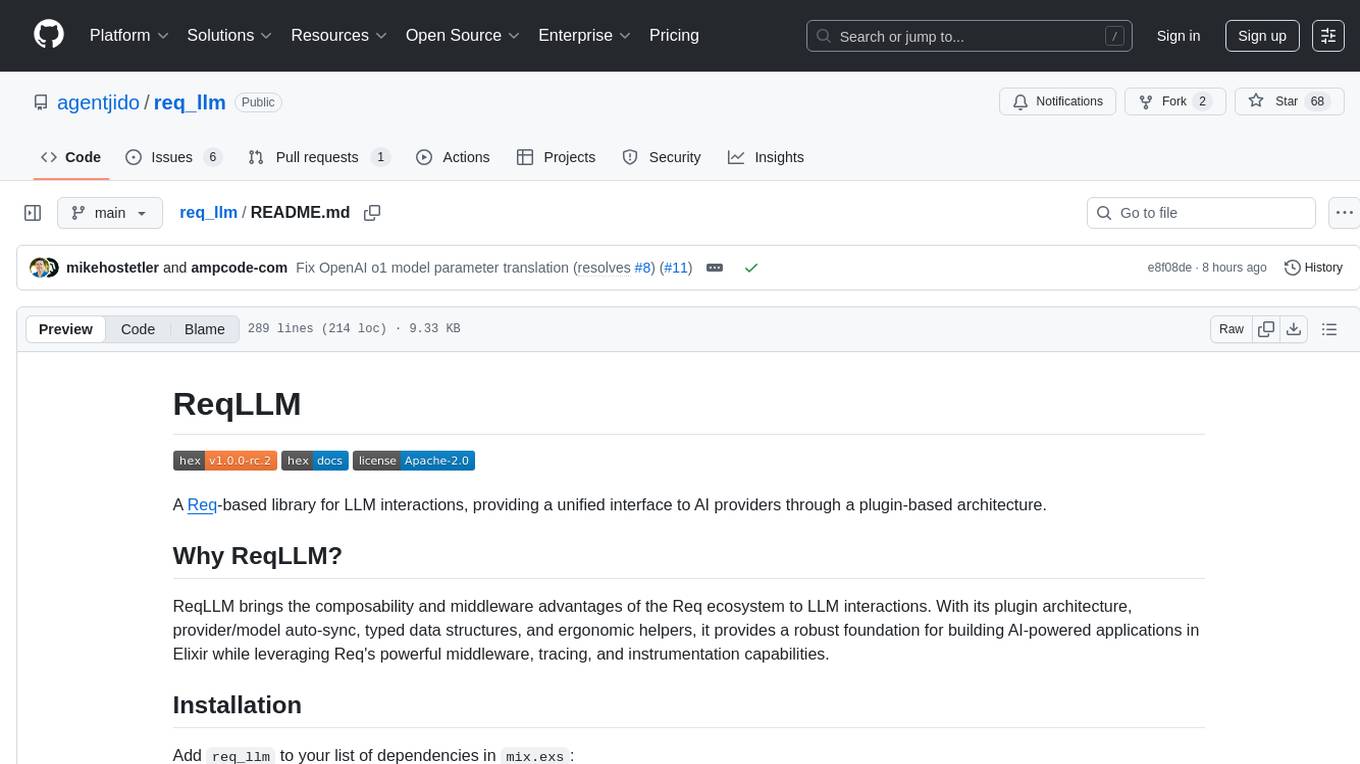
ReqLLM is a Req-based library for LLM interactions, offering a unified interface to AI providers through a plugin-based architecture. It brings composability and middleware advantages to LLM interactions, with features like auto-synced providers/models, typed data structures, ergonomic helpers, streaming capabilities, usage & cost extraction, and a plugin-based provider system. Users can easily generate text, structured data, embeddings, and track usage costs. The tool supports various AI providers like Anthropic, OpenAI, Groq, Google, and xAI, and allows for easy addition of new providers. ReqLLM also provides API key management, detailed documentation, and a roadmap for future enhancements.
README:
A Req-based package to call LLM APIs. The purpose is to standardize the API calls and API responses for all supported LLM providers.
LLM API's are often inconsistent. ReqLLM aims to provide a consistent, data-driven, idiomatic Elixir interface to make requests to these API's and standardize the responses, making it easier to work with LLMs in Elixir.
This package provides two-layers of client interfaces. The top layer is a high-level, provider-agnostic interface that mimic's the Vercel AI SDK and lives in ReqLLM.ex using methods like generate_text/3. This package seeks to standardize this high-level API across all supported providers, making it easy for Elixir developers to with standard features supported by LLMs. However, any high level abstraction requires trade-offs in terms of flexibility and customization.
The low-level client interface directly utilizes Req plugins to make HTTP requests to the LLM API's. This layer is more flexible and customizable, but requires more knowledge of the underlying API's. This package is built around the OpenAI API Baseline standard, making it easier to implement providers that follow this standard. Providers such as Anthropic who do not follow the OpenAI standard are heavily customized through callbacks and protocols.
# Keys are picked up from .env files or environment variables - see `ReqLLM.Keys`
model = "anthropic:claude-3-sonnet-20240229"
ReqLLM.generate_text!(model, "Hello world")
#=> "Hello! How can I assist you today?"
schema = [name: [type: :string, required: true], age: [type: :pos_integer]]
person = ReqLLM.generate_object!(model, "Generate a person", schema)
#=> %{name: "John Doe", age: 30}
{:ok, response} = ReqLLM.generate_text(
model,
ReqLLM.Context.new([
ReqLLM.Context.system("You are a helpful coding assistant"),
ReqLLM.Context.user("Explain recursion in Elixir")
]),
temperature: 0.7,
max_tokens: 200
)
{:ok, response} = ReqLLM.generate_text(
model,
"What's the weather in Paris?",
tools: [
ReqLLM.tool(
name: "get_weather",
description: "Get current weather for a location",
parameter_schema: [
location: [type: :string, required: true, doc: "City name"]
],
callback: {Weather, :fetch_weather, [:extra, :args]}
)
]
)
ReqLLM.stream_text!(model, "Write a short story")
|> Stream.each(&IO.write(&1.text))
|> Stream.run()-
Provider-agnostic model registry
- 45 providers / 665+ models auto-synced from models.dev (
mix req_llm.model_sync) - Cost, context length, modality, capability and deprecation metadata included
- 45 providers / 665+ models auto-synced from models.dev (
-
Canonical data model
- Typed
Context,Message,ContentPart,Tool,StreamChunk,Response,Usage - Multi-modal content parts (text, image URL, tool call, binary)
- All structs implement
Jason.Encoderfor simple persistence / inspection
- Typed
-
Two client layers
- Low-level Req plugin with full HTTP control (
Provider.prepare_request/4,attach/3) - High-level Vercel-AI style helpers (
generate_text/3,stream_text/3,generate_object/4, bang variants)
- Low-level Req plugin with full HTTP control (
-
Structured object generation
-
generate_object/4renders JSON-compatible Elixir maps validated by a NimbleOptions-compiled schema - Zero-copy mapping to provider JSON-schema / function-calling endpoints
-
-
Embedding generation
- Single or batch embeddings via
Embedding.generate/3(Not all providers support this) - Automatic dimension / encoding validation and usage accounting
- Single or batch embeddings via
-
First-class streaming
-
stream_text/3returns a lazyStreamofStreamChunkstructs with delta text, role, index - Works uniformly across providers with internal SSE / chunked-response adaptation
-
-
Usage & cost tracking
-
response.usageexposes input/output tokens and USD cost, calculated from model metadata or provider invoices
-
-
Schema-driven option validation
- All public APIs validate options with NimbleOptions; errors are raised as
ReqLLM.Error.Invalid.*(Splode)
- All public APIs validate options with NimbleOptions; errors are raised as
-
Automatic parameter translation & codecs
- Provider DSL translates canonical options (e.g.
max_tokens->max_completion_tokensfor o1 & o3) to provider-specific names -
Context.CodecandResponse.Codecprotocols map ReqLLM structs to wire formats and back
- Provider DSL translates canonical options (e.g.
-
Flexible model specification
- Accepts
"provider:model",{:provider, "model", opts}tuples, or%ReqLLM.Model{}structs - Helper functions for parsing, introspection and default-merging
- Accepts
-
Secure, layered key management (
ReqLLM.Keys)- Per-request override → in-memory keyring (JidoKeys) → application config → env vars /.env files
-
Extensive reliability tooling
- Fixture-backed test matrix (
LiveFixture) supports cached, live, or provider-filtered runs - Dialyzer, Credo strict rules, and no-comment enforcement keep code quality high
- Fixture-backed test matrix (
ReqLLM makes key management as easy and flexible as possible - this needs to just work.
Please submit a PR if your key management use case is not covered
Keys are pulled from multiple sources with clear precedence: per-request override → in-memory storage → application config → environment variables → .env files.
# Store keys in memory (recommended)
ReqLLM.put_key(:openai_api_key, "sk-...")
ReqLLM.put_key(:anthropic_api_key, "sk-ant-...")
# Retrieve keys with source info
{:ok, key, source} = ReqLLM.get_key(:openai)All functions accept an api_key parameter to override the stored key:
ReqLLM.generate_text("openai:gpt-4", "Hello", api_key: "sk-...")
ReqLLM.stream_text("anthropic:claude-3-sonnet", "Story", api_key: "sk-ant-...")Every response includes detailed usage and cost information calculated from model metadata:
{:ok, response} = ReqLLM.generate_text("openai:gpt-4", "Hello")
response.usage
#=> %{
# input_tokens: 8,
# output_tokens: 12,
# total_tokens: 20,
# input_cost: 0.00024,
# output_cost: 0.00036,
# total_cost: 0.0006
# }A telemetry event [:req_llm, :token_usage] is published on every request with token counts and calculated costs.
ReqLLM uses OpenAI Chat Completions as the baseline API standard. Providers that support this format (like Groq, OpenRouter, xAI) require minimal overrides using the ReqLLM.Provider.DSL. Model metadata is automatically synced from models.dev.
Providers implement the ReqLLM.Provider behavior with functions like encode_body/1, decode_response/1, and optional parameter translation via translate_options/3.
See the Adding a Provider Guide for detailed implementation instructions.
For advanced use cases, you can use ReqLLM providers directly as Req plugins. This is the canonical implementation used by ReqLLM.generate_text/3:
# The canonical pattern from ReqLLM.Generation.generate_text/3
with {:ok, model} <- ReqLLM.Model.from("anthropic:claude-3-sonnet-20240229"), # Parse model spec
{:ok, provider_module} <- ReqLLM.provider(model.provider), # Get provider module
{:ok, request} <- provider_module.prepare_request(:chat, model, "Hello!", temperature: 0.7), # Build Req request
{:ok, %Req.Response{body: response}} <- Req.request(request) do # Execute HTTP request
{:ok, response}
end
# Customize the Req pipeline with additional headers or middleware
{:ok, model} = ReqLLM.Model.from("anthropic:claude-3-sonnet")
{:ok, provider_module} = ReqLLM.provider(model.provider)
{:ok, request} = provider_module.prepare_request(:chat, model, "Hello!", temperature: 0.7)
# Add custom headers or middleware before sending
{:ok, model} = ReqLLM.Model.from("anthropic:claude-3-sonnet-20240229")
{:ok, provider_module} = ReqLLM.provider(model.provider)
{:ok, request} = provider_module.prepare_request(:chat, model, "Hello!", temperature: 0.7)
# Add custom headers or middleware before sending
custom_request =
request
|> Req.Request.put_header("x-request-id", "my-custom-id")
|> Req.Request.put_header("x-source", "my-app")
{:ok, response} = Req.request(custom_request)This approach gives you full control over the Req pipeline, allowing you to add custom middleware, modify requests, or integrate with existing Req-based applications.
- Getting Started – first call and basic concepts
- Core Concepts – architecture & data model
- API Reference – functions & types
- Data Structures – detailed type information
- Coverage Testing – testing strategies
- Adding a Provider – extend with new providers
ReqLLM 1.0-rc.3 is a release candidate. The core API is stable, but minor breaking changes may occur before the final 1.0.0 release based on community feedback.
Planned for 1.x:
- Additional open-source providers (Ollama, LocalAI)
- Enhanced streaming capabilities
- Performance optimizations
- Extended model metadata
# Install dependencies
mix deps.get
# Run tests with cached fixtures
mix test
# Run quality checks
mix quality # format, compile, dialyzer, credo
# Generate documentation
mix docsTests use cached JSON fixtures by default. To regenerate fixtures against live APIs (optional):
# Regenerate all fixtures
LIVE=true mix test
# Regenerate specific provider fixtures using test tags
LIVE=true mix test --only "provider:anthropic"- Fork the repository
- Create a feature branch
- Add tests for your changes
- Run
mix qualityto ensure standards - Submit a pull request
Copyright 2025 Mike Hostetler
Licensed under the Apache License, Version 2.0 (the "License"); you may not use this file except in compliance with the License. You may obtain a copy of the License at
http://www.apache.org/licenses/LICENSE-2.0
Unless required by applicable law or agreed to in writing, software distributed under the License is distributed on an "AS IS" BASIS, WITHOUT WARRANTIES OR CONDITIONS OF ANY KIND, either express or implied. See the License for the specific language governing permissions and limitations under the License.
For Tasks:
Click tags to check more tools for each tasksFor Jobs:
Alternative AI tools for req_llm
Similar Open Source Tools

req_llm
ReqLLM is a Req-based library for LLM interactions, offering a unified interface to AI providers through a plugin-based architecture. It brings composability and middleware advantages to LLM interactions, with features like auto-synced providers/models, typed data structures, ergonomic helpers, streaming capabilities, usage & cost extraction, and a plugin-based provider system. Users can easily generate text, structured data, embeddings, and track usage costs. The tool supports various AI providers like Anthropic, OpenAI, Groq, Google, and xAI, and allows for easy addition of new providers. ReqLLM also provides API key management, detailed documentation, and a roadmap for future enhancements.
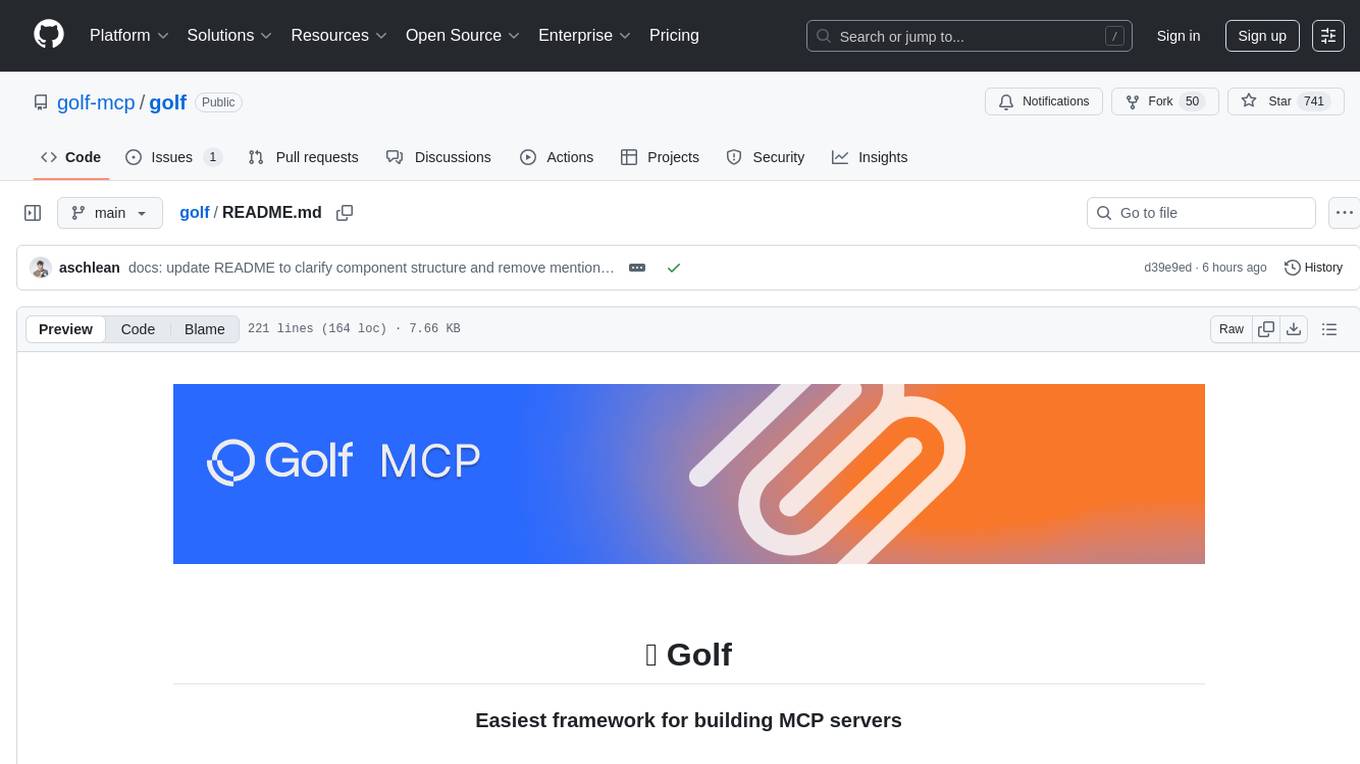
golf
Golf is a simple command-line tool for calculating the distance between two geographic coordinates. It uses the Haversine formula to accurately determine the distance between two points on the Earth's surface. This tool is useful for developers working on location-based applications or projects that require distance calculations. With Golf, users can easily input latitude and longitude coordinates and get the precise distance in kilometers or miles. The tool is lightweight, easy to use, and can be integrated into various programming workflows.
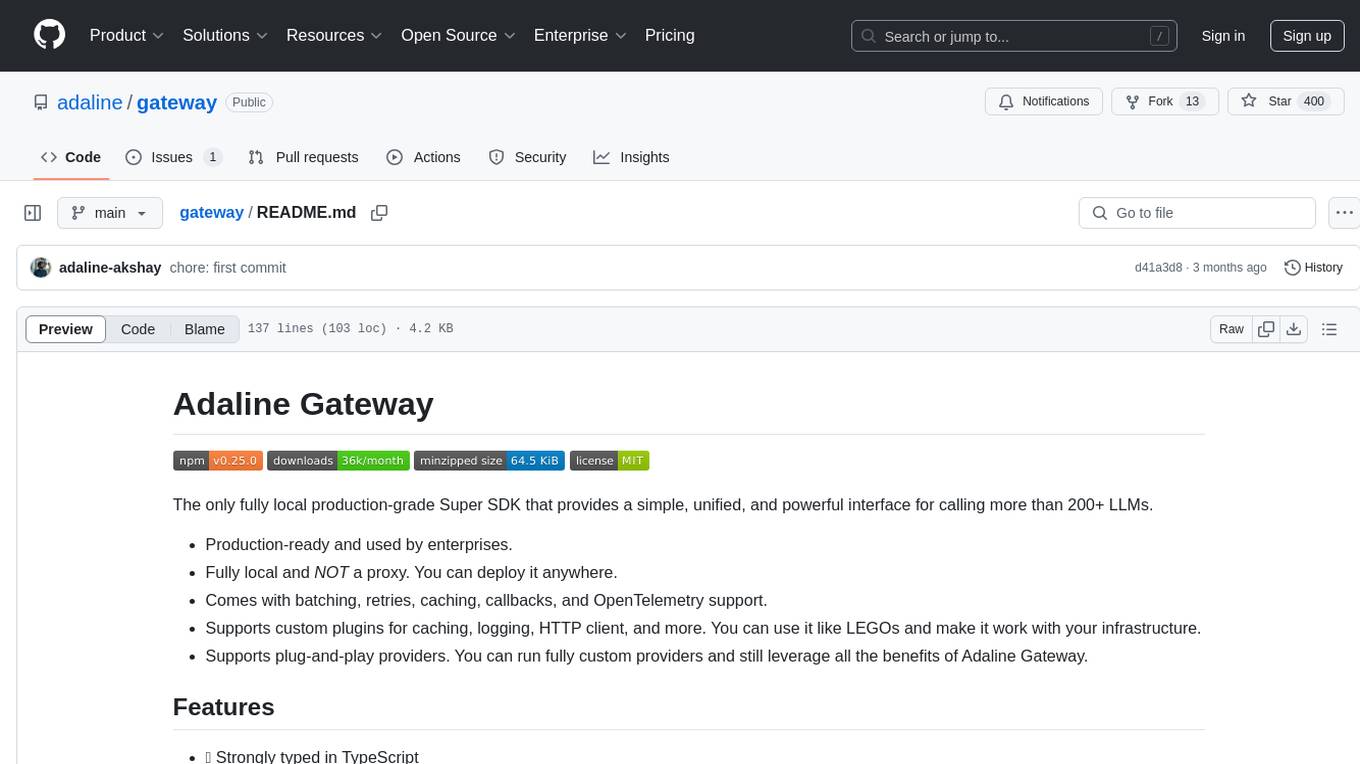
gateway
Adaline Gateway is a fully local production-grade Super SDK that offers a unified interface for calling over 200+ LLMs. It is production-ready, supports batching, retries, caching, callbacks, and OpenTelemetry. Users can create custom plugins and providers for seamless integration with their infrastructure.
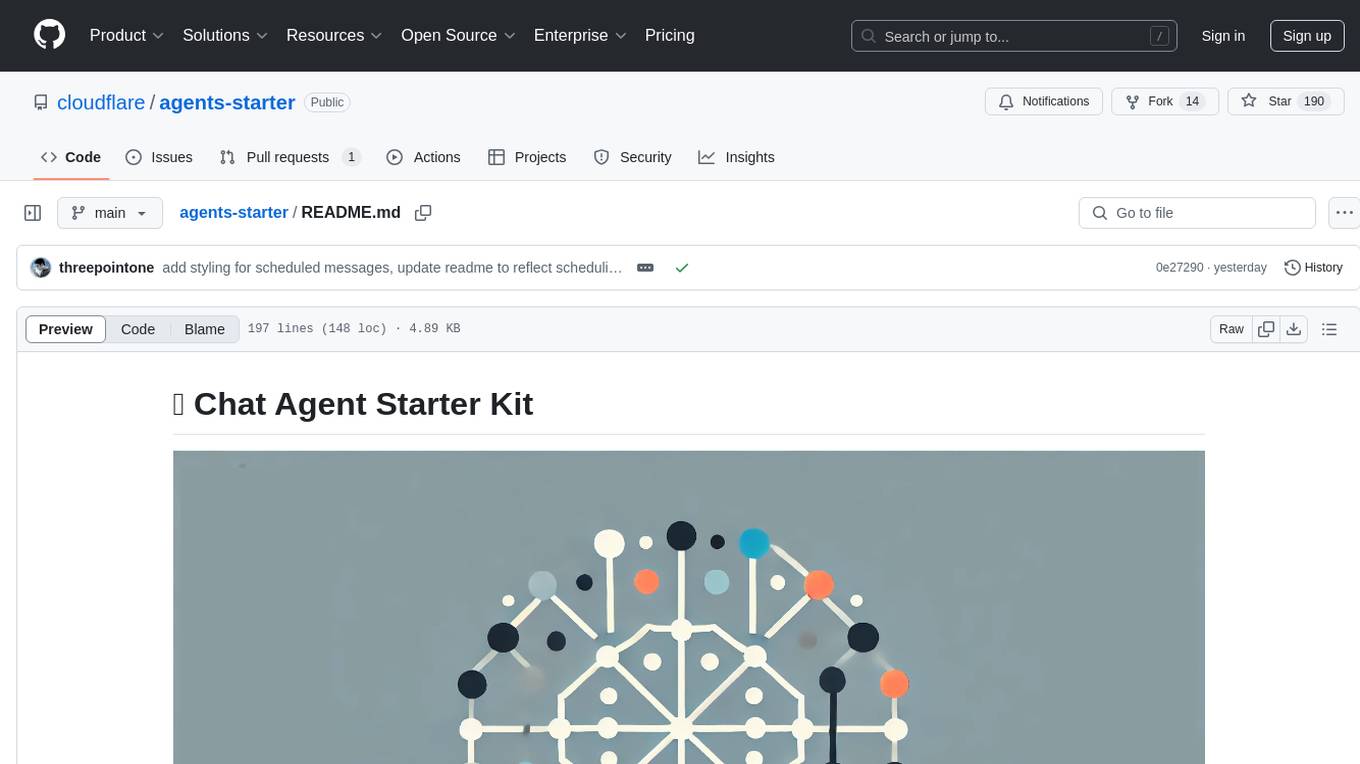
agents-starter
A starter template for building AI-powered chat agents using Cloudflare's Agent platform, powered by agents-sdk. It provides a foundation for creating interactive chat experiences with AI, complete with a modern UI and tool integration capabilities. Features include interactive chat interface with AI, built-in tool system with human-in-the-loop confirmation, advanced task scheduling, dark/light theme support, real-time streaming responses, state management, and chat history. Prerequisites include a Cloudflare account and OpenAI API key. The project structure includes components for chat UI implementation, chat agent logic, tool definitions, and helper functions. Customization guide covers adding new tools, modifying the UI, and example use cases for customer support, development assistant, data analysis assistant, personal productivity assistant, and scheduling assistant.
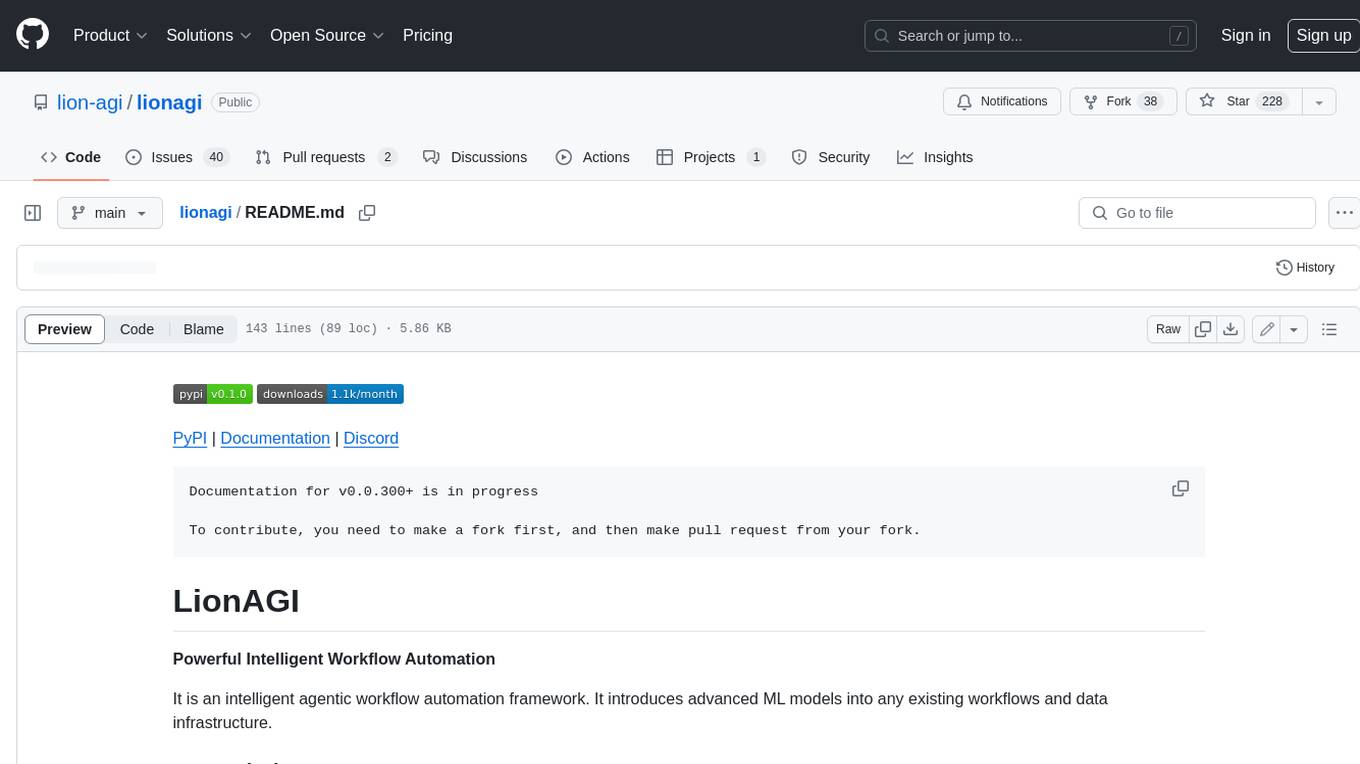
lionagi
LionAGI is a powerful intelligent workflow automation framework that introduces advanced ML models into any existing workflows and data infrastructure. It can interact with almost any model, run interactions in parallel for most models, produce structured pydantic outputs with flexible usage, automate workflow via graph based agents, use advanced prompting techniques, and more. LionAGI aims to provide a centralized agent-managed framework for "ML-powered tools coordination" and to dramatically lower the barrier of entries for creating use-case/domain specific tools. It is designed to be asynchronous only and requires Python 3.10 or higher.
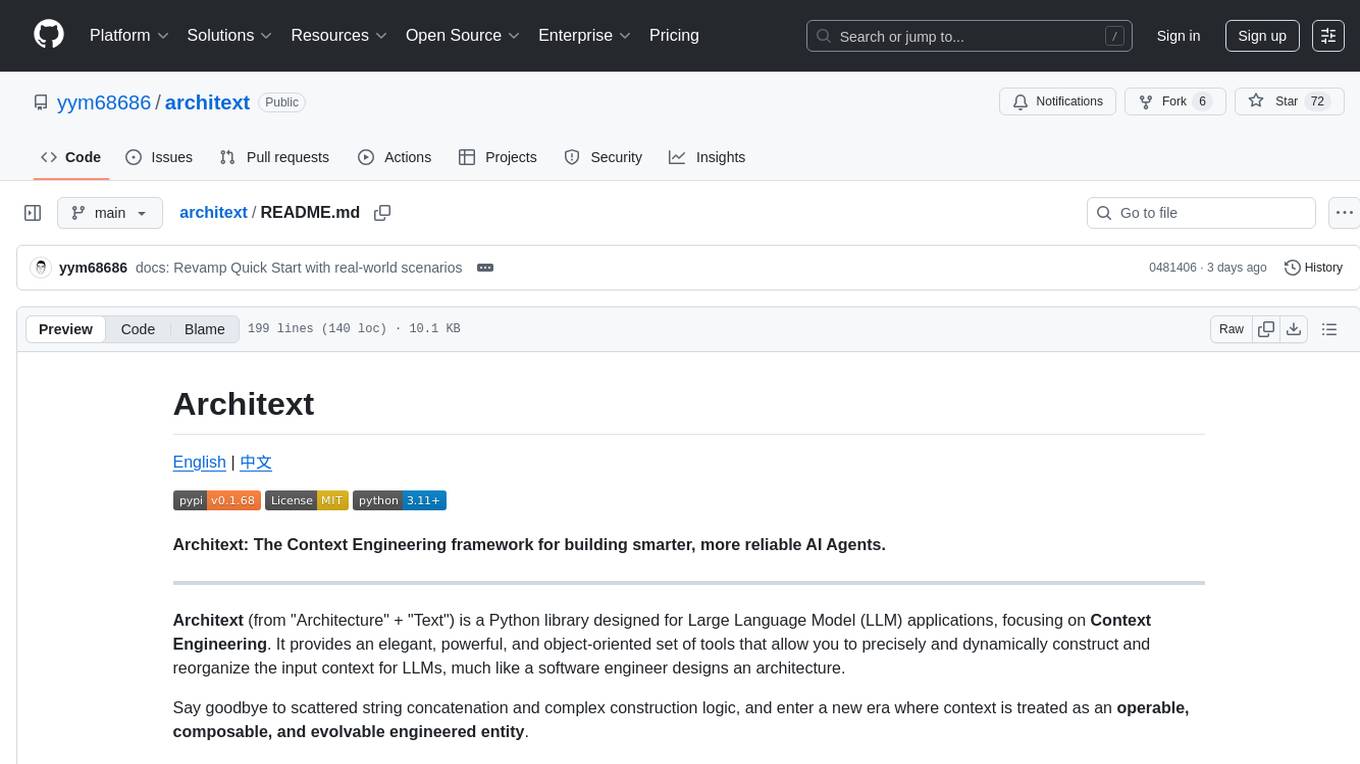
architext
Architext is a Python library designed for Large Language Model (LLM) applications, focusing on Context Engineering. It provides tools to construct and reorganize input context for LLMs dynamically. The library aims to elevate context construction from ad-hoc to systematic engineering, enabling precise manipulation of context content for AI Agents.
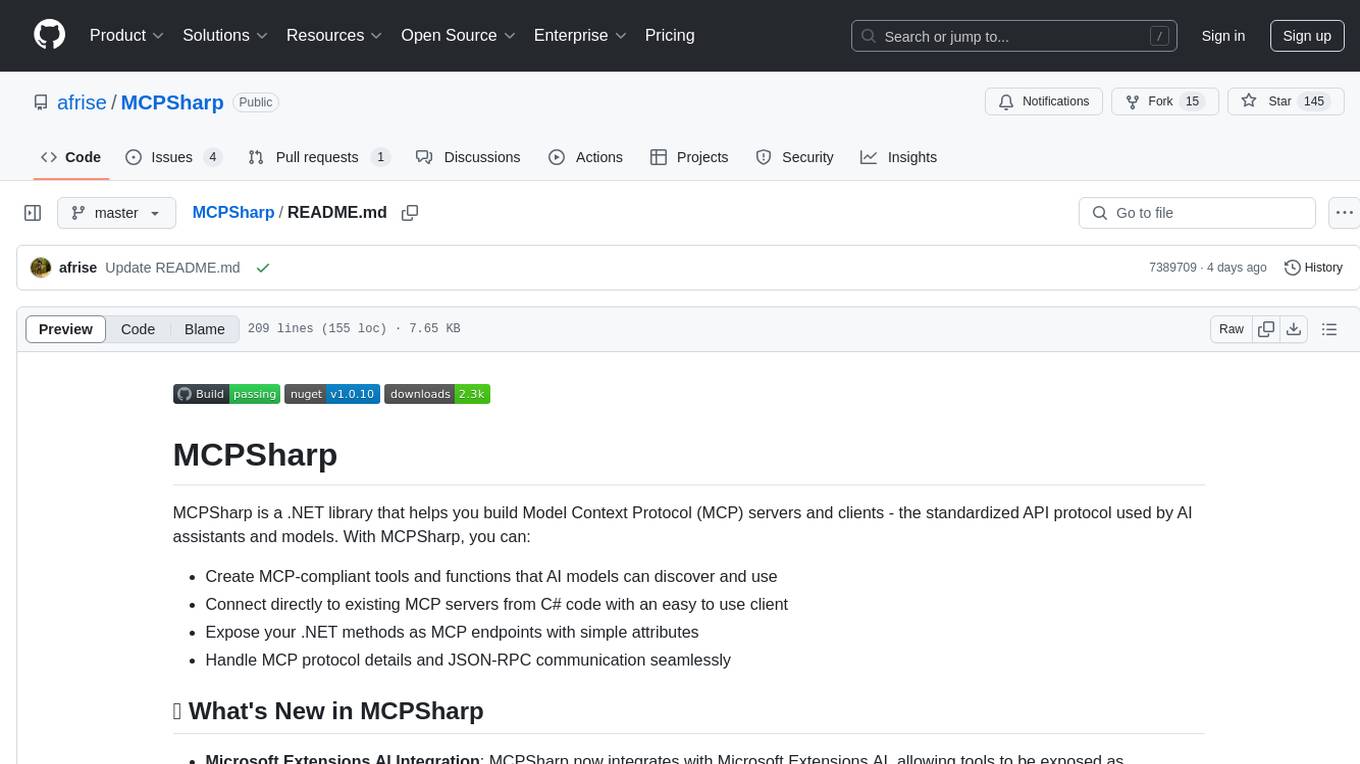
MCPSharp
MCPSharp is a .NET library that helps build Model Context Protocol (MCP) servers and clients for AI assistants and models. It allows creating MCP-compliant tools, connecting to existing MCP servers, exposing .NET methods as MCP endpoints, and handling MCP protocol details seamlessly. With features like attribute-based API, JSON-RPC support, parameter validation, and type conversion, MCPSharp simplifies the development of AI capabilities in applications through standardized interfaces.
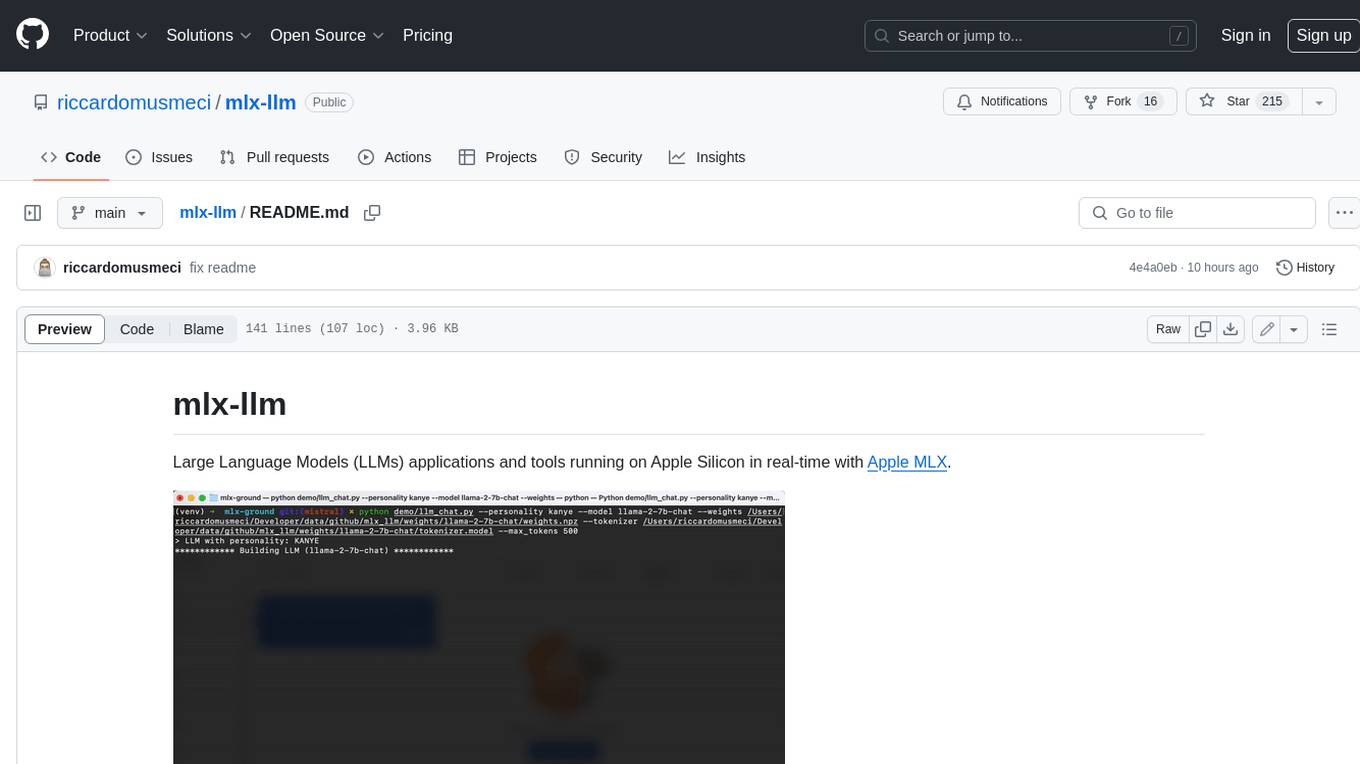
mlx-llm
mlx-llm is a library that allows you to run Large Language Models (LLMs) on Apple Silicon devices in real-time using Apple's MLX framework. It provides a simple and easy-to-use API for creating, loading, and using LLM models, as well as a variety of applications such as chatbots, fine-tuning, and retrieval-augmented generation.
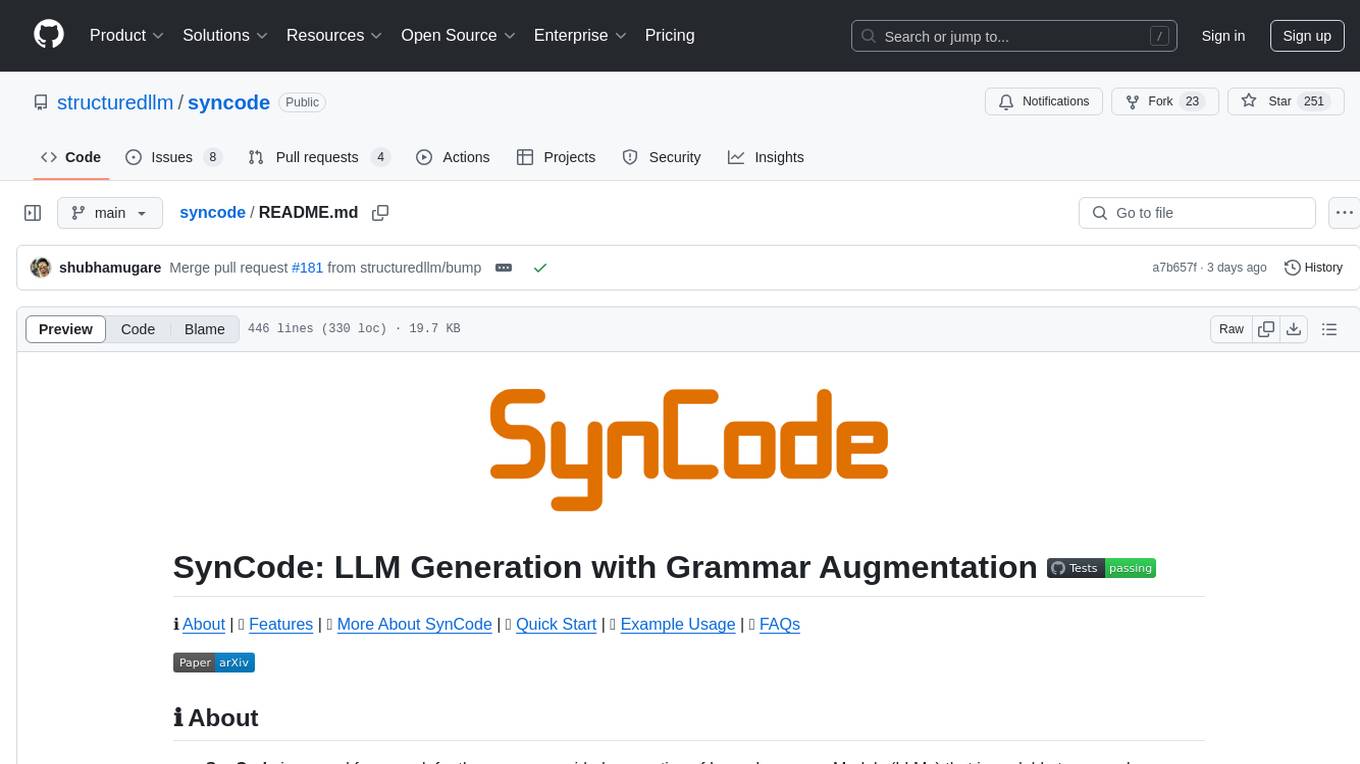
syncode
SynCode is a novel framework for the grammar-guided generation of Large Language Models (LLMs) that ensures syntactically valid output based on a Context-Free Grammar (CFG). It supports various programming languages like Python, Go, SQL, Math, JSON, and more. Users can define custom grammars using EBNF syntax. SynCode offers fast generation, seamless integration with HuggingFace Language Models, and the ability to sample with different decoding strategies.
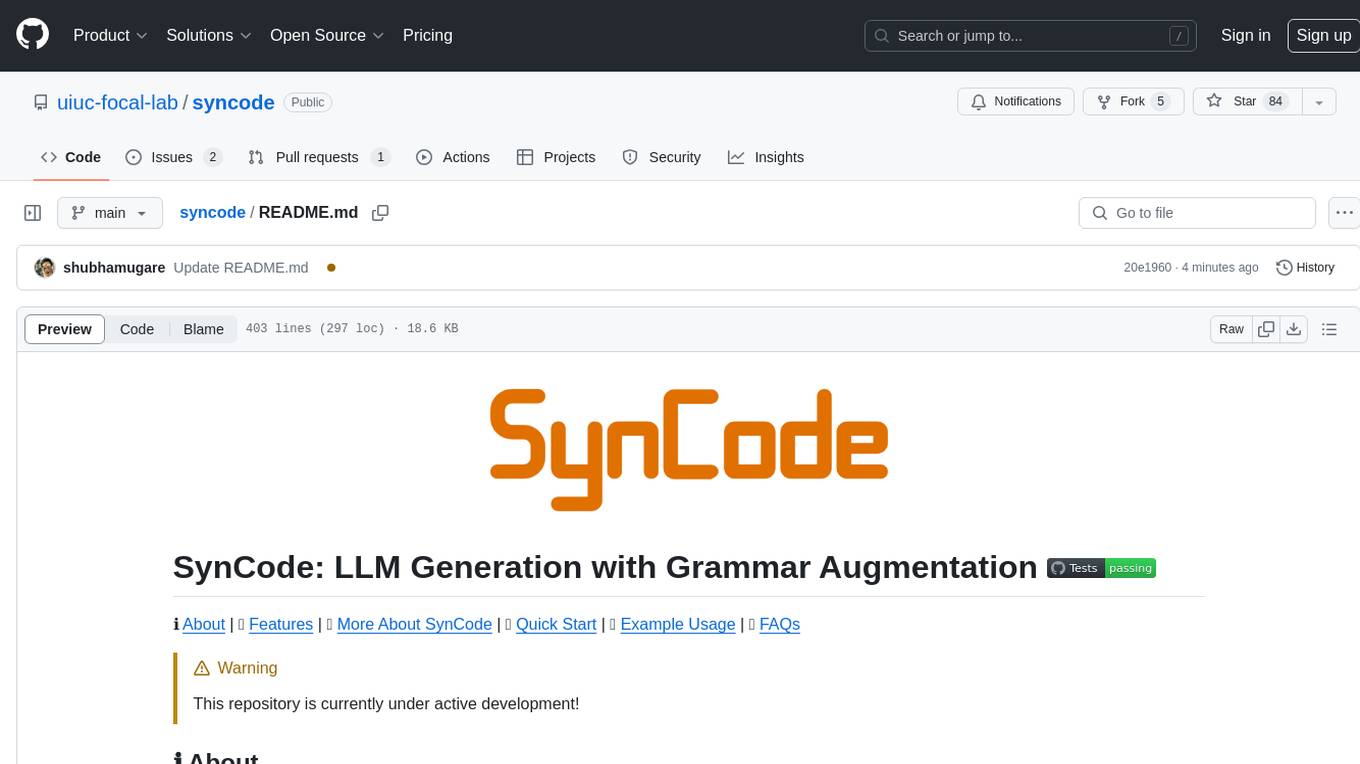
syncode
SynCode is a novel framework for the grammar-guided generation of Large Language Models (LLMs) that ensures syntactically valid output with respect to defined Context-Free Grammar (CFG) rules. It supports general-purpose programming languages like Python, Go, SQL, JSON, and more, allowing users to define custom grammars using EBNF syntax. The tool compares favorably to other constrained decoders and offers features like fast grammar-guided generation, compatibility with HuggingFace Language Models, and the ability to work with various decoding strategies.
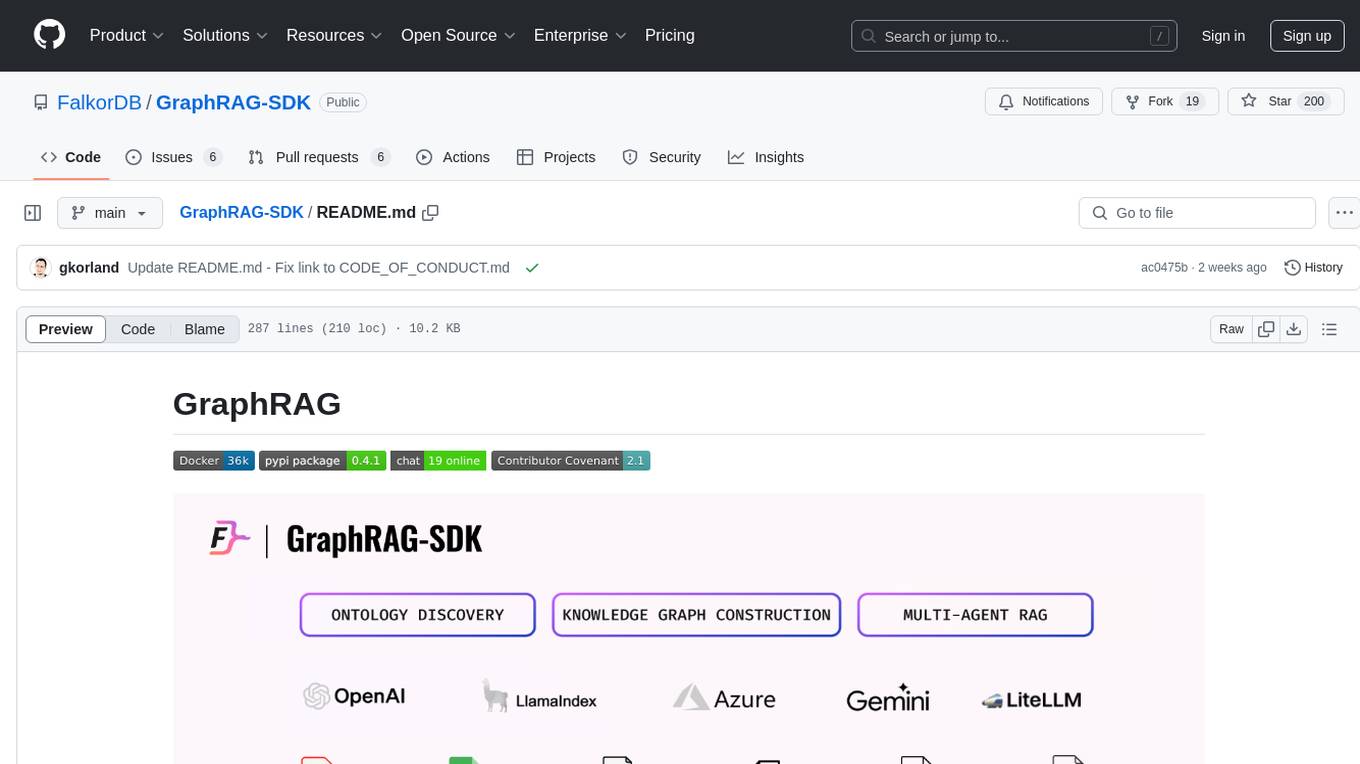
GraphRAG-SDK
Build fast and accurate GenAI applications with GraphRAG SDK, a specialized toolkit for building Graph Retrieval-Augmented Generation (GraphRAG) systems. It integrates knowledge graphs, ontology management, and state-of-the-art LLMs to deliver accurate, efficient, and customizable RAG workflows. The SDK simplifies the development process by automating ontology creation, knowledge graph agent creation, and query handling, enabling users to interact and query their knowledge graphs effectively. It supports multi-agent systems and orchestrates agents specialized in different domains. The SDK is optimized for FalkorDB, ensuring high performance and scalability for large-scale applications. By leveraging knowledge graphs, it enables semantic relationships and ontology-driven queries that go beyond standard vector similarity, enhancing retrieval-augmented generation capabilities.
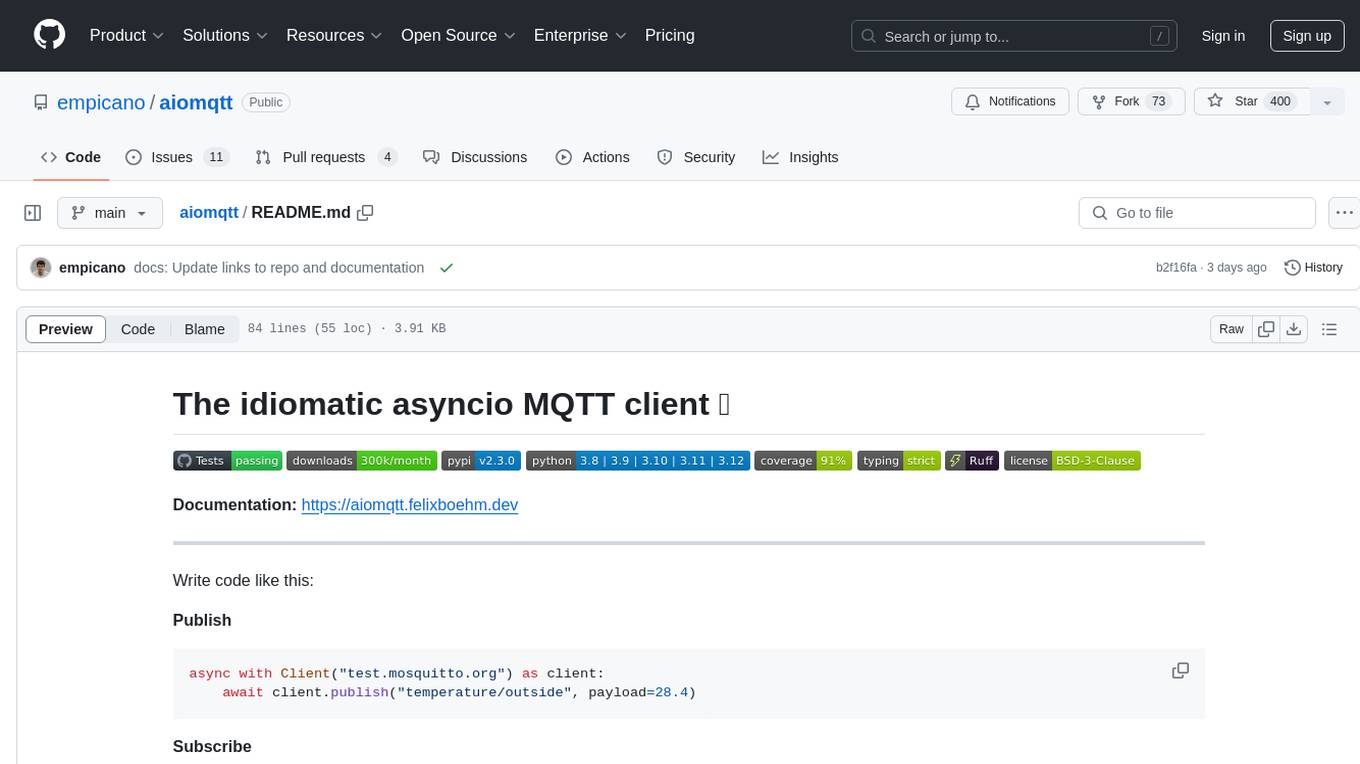
aiomqtt
aiomqtt is an idiomatic asyncio MQTT client that allows users to interact with MQTT brokers using asyncio in Python. It eliminates the need for callbacks and return codes, providing a more streamlined experience. The tool supports MQTT versions 5.0, 3.1.1, and 3.1, and offers graceful disconnection handling. It is fully type-hinted, making it easier to work with. Users can publish and subscribe to MQTT topics with ease, making it a versatile tool for MQTT communication in Python.
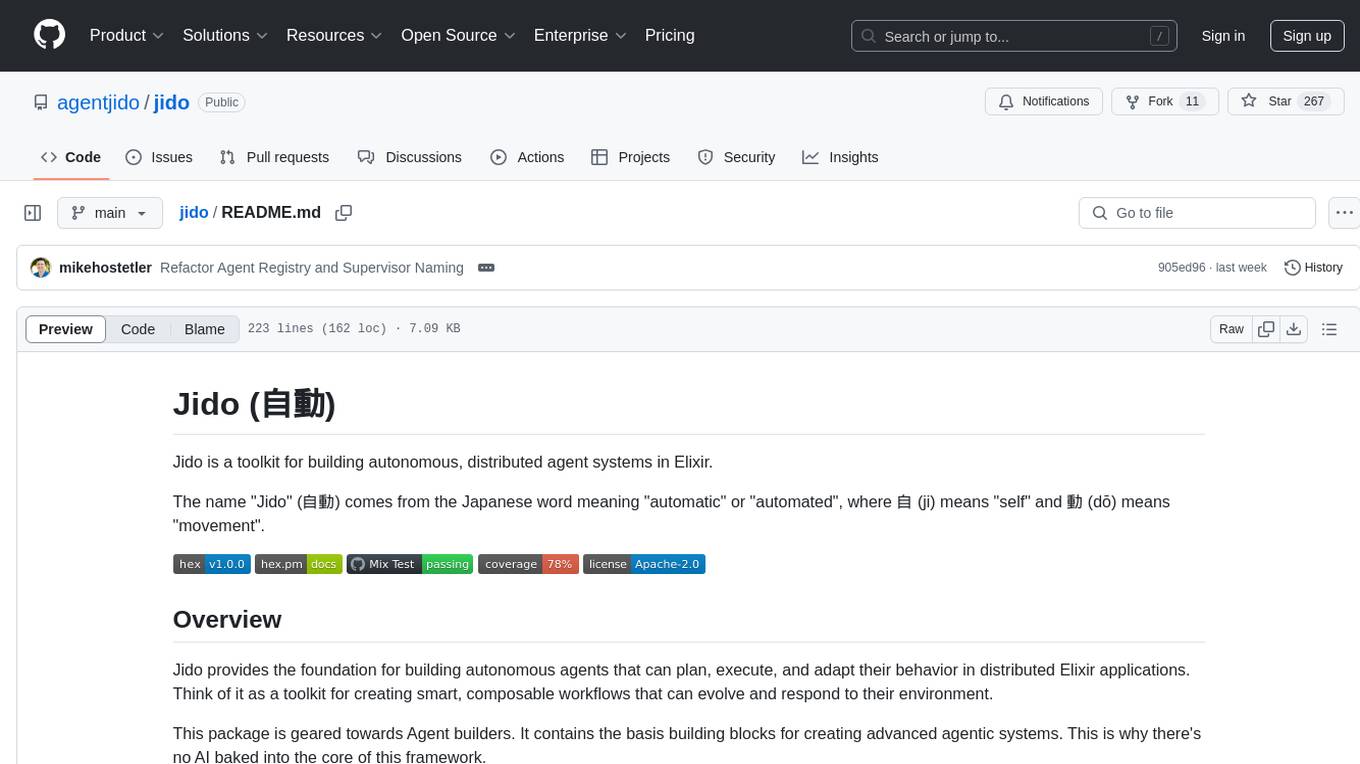
jido
Jido is a toolkit for building autonomous, distributed agent systems in Elixir. It provides the foundation for creating smart, composable workflows that can evolve and respond to their environment. Geared towards Agent builders, it contains core state primitives, composable actions, agent data structures, real-time sensors, signal system, skills, and testing tools. Jido is designed for multi-node Elixir clusters and offers rich helpers for unit and property-based testing.
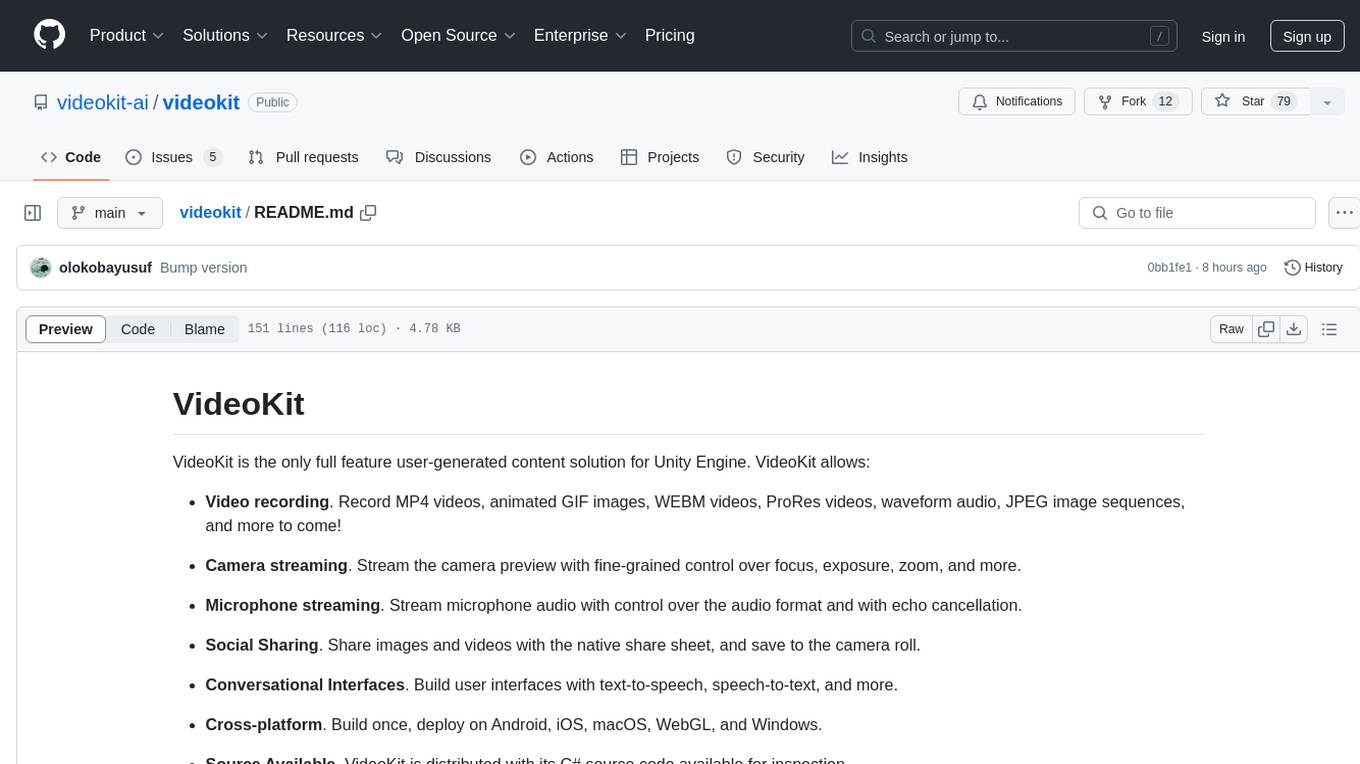
videokit
VideoKit is a full-featured user-generated content solution for Unity Engine, enabling video recording, camera streaming, microphone streaming, social sharing, and conversational interfaces. It is cross-platform, with C# source code available for inspection. Users can share media, save to camera roll, pick from camera roll, stream camera preview, record videos, remove background, caption audio, and convert text commands. VideoKit requires Unity 2022.3+ and supports Android, iOS, macOS, Windows, and WebGL platforms.
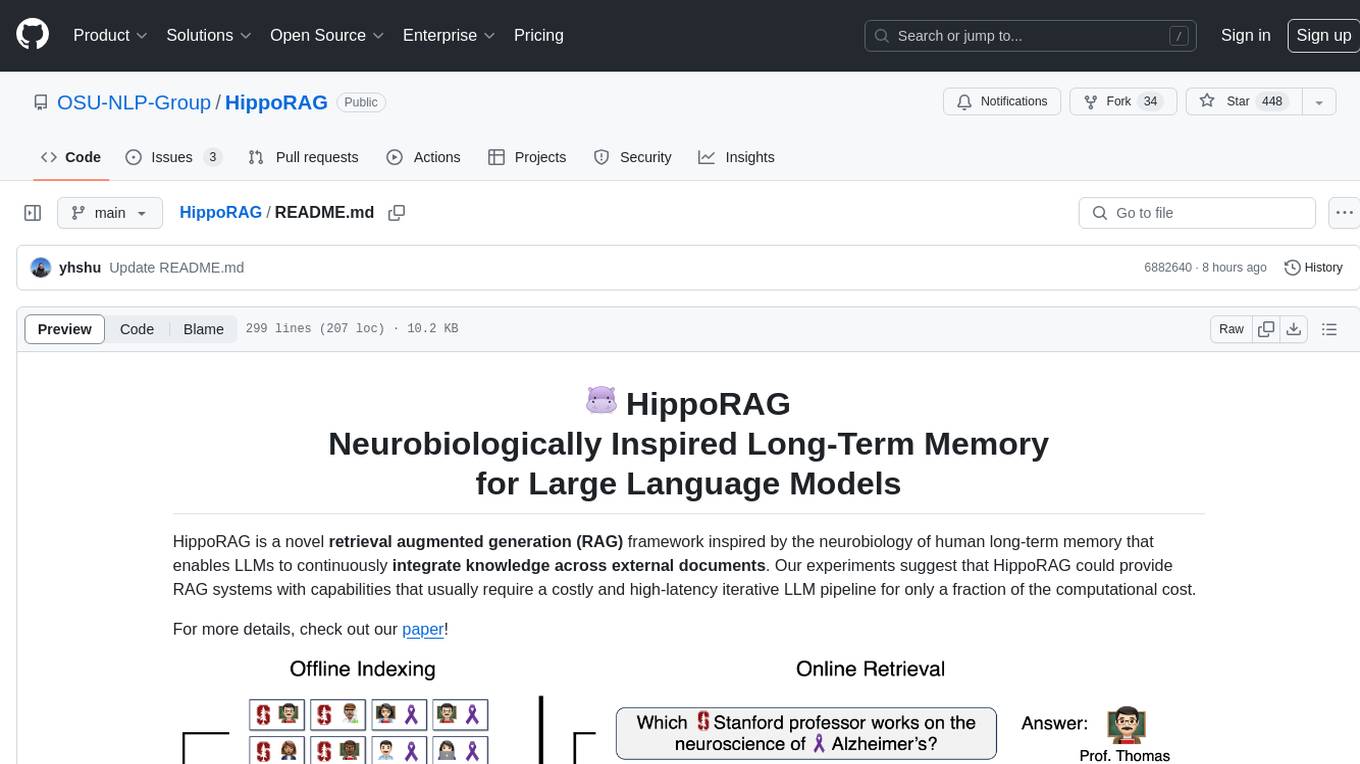
HippoRAG
HippoRAG is a novel retrieval augmented generation (RAG) framework inspired by the neurobiology of human long-term memory that enables Large Language Models (LLMs) to continuously integrate knowledge across external documents. It provides RAG systems with capabilities that usually require a costly and high-latency iterative LLM pipeline for only a fraction of the computational cost. The tool facilitates setting up retrieval corpus, indexing, and retrieval processes for LLMs, offering flexibility in choosing different online LLM APIs or offline LLM deployments through LangChain integration. Users can run retrieval on pre-defined queries or integrate directly with the HippoRAG API. The tool also supports reproducibility of experiments and provides data, baselines, and hyperparameter tuning scripts for research purposes.
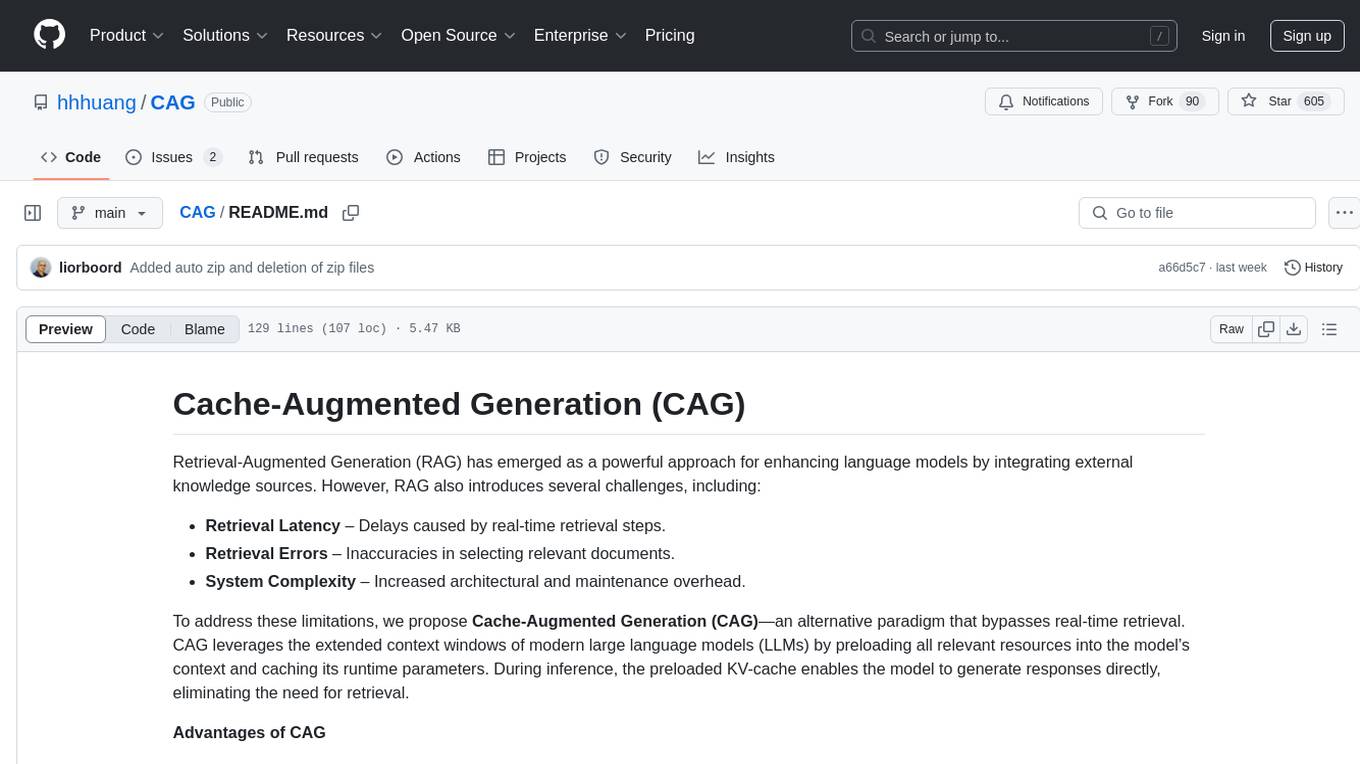
CAG
Cache-Augmented Generation (CAG) is an alternative paradigm to Retrieval-Augmented Generation (RAG) that eliminates real-time retrieval delays and errors by preloading all relevant resources into the model's context. CAG leverages extended context windows of large language models (LLMs) to generate responses directly, providing reduced latency, improved reliability, and simplified design. While CAG has limitations in knowledge size and context length, advancements in LLMs are addressing these issues, making CAG a practical and scalable alternative for complex applications.
For similar tasks

req_llm
ReqLLM is a Req-based library for LLM interactions, offering a unified interface to AI providers through a plugin-based architecture. It brings composability and middleware advantages to LLM interactions, with features like auto-synced providers/models, typed data structures, ergonomic helpers, streaming capabilities, usage & cost extraction, and a plugin-based provider system. Users can easily generate text, structured data, embeddings, and track usage costs. The tool supports various AI providers like Anthropic, OpenAI, Groq, Google, and xAI, and allows for easy addition of new providers. ReqLLM also provides API key management, detailed documentation, and a roadmap for future enhancements.

LLMStack
LLMStack is a no-code platform for building generative AI agents, workflows, and chatbots. It allows users to connect their own data, internal tools, and GPT-powered models without any coding experience. LLMStack can be deployed to the cloud or on-premise and can be accessed via HTTP API or triggered from Slack or Discord.

LocalAI
LocalAI is a free and open-source OpenAI alternative that acts as a drop-in replacement REST API compatible with OpenAI (Elevenlabs, Anthropic, etc.) API specifications for local AI inferencing. It allows users to run LLMs, generate images, audio, and more locally or on-premises with consumer-grade hardware, supporting multiple model families and not requiring a GPU. LocalAI offers features such as text generation with GPTs, text-to-audio, audio-to-text transcription, image generation with stable diffusion, OpenAI functions, embeddings generation for vector databases, constrained grammars, downloading models directly from Huggingface, and a Vision API. It provides a detailed step-by-step introduction in its Getting Started guide and supports community integrations such as custom containers, WebUIs, model galleries, and various bots for Discord, Slack, and Telegram. LocalAI also offers resources like an LLM fine-tuning guide, instructions for local building and Kubernetes installation, projects integrating LocalAI, and a how-tos section curated by the community. It encourages users to cite the repository when utilizing it in downstream projects and acknowledges the contributions of various software from the community.

AiTreasureBox
AiTreasureBox is a versatile AI tool that provides a collection of pre-trained models and algorithms for various machine learning tasks. It simplifies the process of implementing AI solutions by offering ready-to-use components that can be easily integrated into projects. With AiTreasureBox, users can quickly prototype and deploy AI applications without the need for extensive knowledge in machine learning or deep learning. The tool covers a wide range of tasks such as image classification, text generation, sentiment analysis, object detection, and more. It is designed to be user-friendly and accessible to both beginners and experienced developers, making AI development more efficient and accessible to a wider audience.

glide
Glide is a cloud-native LLM gateway that provides a unified REST API for accessing various large language models (LLMs) from different providers. It handles LLMOps tasks such as model failover, caching, key management, and more, making it easy to integrate LLMs into applications. Glide supports popular LLM providers like OpenAI, Anthropic, Azure OpenAI, AWS Bedrock (Titan), Cohere, Google Gemini, OctoML, and Ollama. It offers high availability, performance, and observability, and provides SDKs for Python and NodeJS to simplify integration.

jupyter-ai
Jupyter AI connects generative AI with Jupyter notebooks. It provides a user-friendly and powerful way to explore generative AI models in notebooks and improve your productivity in JupyterLab and the Jupyter Notebook. Specifically, Jupyter AI offers: * An `%%ai` magic that turns the Jupyter notebook into a reproducible generative AI playground. This works anywhere the IPython kernel runs (JupyterLab, Jupyter Notebook, Google Colab, Kaggle, VSCode, etc.). * A native chat UI in JupyterLab that enables you to work with generative AI as a conversational assistant. * Support for a wide range of generative model providers, including AI21, Anthropic, AWS, Cohere, Gemini, Hugging Face, NVIDIA, and OpenAI. * Local model support through GPT4All, enabling use of generative AI models on consumer grade machines with ease and privacy.

langchain_dart
LangChain.dart is a Dart port of the popular LangChain Python framework created by Harrison Chase. LangChain provides a set of ready-to-use components for working with language models and a standard interface for chaining them together to formulate more advanced use cases (e.g. chatbots, Q&A with RAG, agents, summarization, extraction, etc.). The components can be grouped into a few core modules: * **Model I/O:** LangChain offers a unified API for interacting with various LLM providers (e.g. OpenAI, Google, Mistral, Ollama, etc.), allowing developers to switch between them with ease. Additionally, it provides tools for managing model inputs (prompt templates and example selectors) and parsing the resulting model outputs (output parsers). * **Retrieval:** assists in loading user data (via document loaders), transforming it (with text splitters), extracting its meaning (using embedding models), storing (in vector stores) and retrieving it (through retrievers) so that it can be used to ground the model's responses (i.e. Retrieval-Augmented Generation or RAG). * **Agents:** "bots" that leverage LLMs to make informed decisions about which available tools (such as web search, calculators, database lookup, etc.) to use to accomplish the designated task. The different components can be composed together using the LangChain Expression Language (LCEL).

infinity
Infinity is an AI-native database designed for LLM applications, providing incredibly fast full-text and vector search capabilities. It supports a wide range of data types, including vectors, full-text, and structured data, and offers a fused search feature that combines multiple embeddings and full text. Infinity is easy to use, with an intuitive Python API and a single-binary architecture that simplifies deployment. It achieves high performance, with 0.1 milliseconds query latency on million-scale vector datasets and up to 15K QPS.
For similar jobs

sweep
Sweep is an AI junior developer that turns bugs and feature requests into code changes. It automatically handles developer experience improvements like adding type hints and improving test coverage.

teams-ai
The Teams AI Library is a software development kit (SDK) that helps developers create bots that can interact with Teams and Microsoft 365 applications. It is built on top of the Bot Framework SDK and simplifies the process of developing bots that interact with Teams' artificial intelligence capabilities. The SDK is available for JavaScript/TypeScript, .NET, and Python.

ai-guide
This guide is dedicated to Large Language Models (LLMs) that you can run on your home computer. It assumes your PC is a lower-end, non-gaming setup.

classifai
Supercharge WordPress Content Workflows and Engagement with Artificial Intelligence. Tap into leading cloud-based services like OpenAI, Microsoft Azure AI, Google Gemini and IBM Watson to augment your WordPress-powered websites. Publish content faster while improving SEO performance and increasing audience engagement. ClassifAI integrates Artificial Intelligence and Machine Learning technologies to lighten your workload and eliminate tedious tasks, giving you more time to create original content that matters.

chatbot-ui
Chatbot UI is an open-source AI chat app that allows users to create and deploy their own AI chatbots. It is easy to use and can be customized to fit any need. Chatbot UI is perfect for businesses, developers, and anyone who wants to create a chatbot.

BricksLLM
BricksLLM is a cloud native AI gateway written in Go. Currently, it provides native support for OpenAI, Anthropic, Azure OpenAI and vLLM. BricksLLM aims to provide enterprise level infrastructure that can power any LLM production use cases. Here are some use cases for BricksLLM: * Set LLM usage limits for users on different pricing tiers * Track LLM usage on a per user and per organization basis * Block or redact requests containing PIIs * Improve LLM reliability with failovers, retries and caching * Distribute API keys with rate limits and cost limits for internal development/production use cases * Distribute API keys with rate limits and cost limits for students

uAgents
uAgents is a Python library developed by Fetch.ai that allows for the creation of autonomous AI agents. These agents can perform various tasks on a schedule or take action on various events. uAgents are easy to create and manage, and they are connected to a fast-growing network of other uAgents. They are also secure, with cryptographically secured messages and wallets.

griptape
Griptape is a modular Python framework for building AI-powered applications that securely connect to your enterprise data and APIs. It offers developers the ability to maintain control and flexibility at every step. Griptape's core components include Structures (Agents, Pipelines, and Workflows), Tasks, Tools, Memory (Conversation Memory, Task Memory, and Meta Memory), Drivers (Prompt and Embedding Drivers, Vector Store Drivers, Image Generation Drivers, Image Query Drivers, SQL Drivers, Web Scraper Drivers, and Conversation Memory Drivers), Engines (Query Engines, Extraction Engines, Summary Engines, Image Generation Engines, and Image Query Engines), and additional components (Rulesets, Loaders, Artifacts, Chunkers, and Tokenizers). Griptape enables developers to create AI-powered applications with ease and efficiency.


